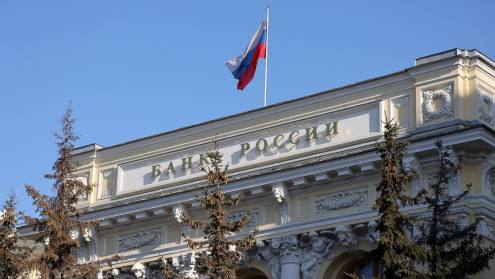Denis Bugrov joined Sberbank in February 2008, but the former McKinsey executive is still not quite used to hand-signing memoranda to set his decisions in motion. After 13 years as a management consultant advising Russian banks and telecoms companies, he was one of several new board members brought in by German Gref, who became Sberbank's CEO in November 2007 after stepping down as Russia's economy minister.
As head of strategy, Mr Bugrov's brief is to modernise a bank whose state ownership and size - 250,000 staff across a 21,000-branch network - has led to its characterisation as a bloated government department rather than an efficient financial institution.
"About 12,000 of those branches are rural, of which 60% have one member of staff or less - in other words they are not open all week. We came to the conclusion that a very modest reduction would achieve 80% of the benefits," says Mr Bugrov.
Radical change
Even so, the bank is undertaking a radical overhaul of its organisation from branch level upwards, based on the Toyota lean production model and called the Sberbank Production System (SPS). The SPS has been rolled out to about 200 branches to date, and the results are highly promising. Queues have halved, product sales tripled and staff have freed up 40% of their time.
The reorganisation plan also contains a road map for back-office consolidation, which has already folded 13 units in the Moscow region down to one, with a 50% productivity improvement. The 12,500-strong network of retail loan officers taking individual decisions will also be centralised, to build an underwriting system intended to reduce the time to decision from the present level of two weeks to two days from mid-2010.
Managing asset quality
The financial crisis was already unfolding by the time the board passed the plan in October 2008, which Mr Bugrov says was designed to be robust to deterioration in the economic environment.
"We obviously see some impact, particularly a change of emphasis, so the improvements we intended on risk management and efficiency are more urgent," he says. Staff costs declined 4.9% year on year in the first half of 2009, and the bank recorded a net profit of Rbs6bn, of which Rbs5.4bn was generated in the second quarter.
However, provisioning was up eleven-fold year on year, to 7.1% of the loan portfolio, covering 110% of current non-performing loans (NPLs). Mr Bugrov expects provisioning to peak at about 9% to 10%, and says the asset quality on the retail side has performed better than expected, as underwriting standards were conservative.
By contrast, the corporate loan book has been more troubled, especially on the bank's exposure to retail trade, construction and automotive industries. "This has forced us to take a long, hard look at both our underwriting and our remedial and workout management. We have gone back to basics on underwriting and we are now monitoring all exposures above $6m from the centre on a bi-weekly basis," says Mr Bugrov.
Sberbank Capital, its 100%-owned subsidiary which manages equity exposure resulting from collections on corporate NPLs, has been very active. But since Sberbank is responsible for one-third of all corporate lending in Russia, its management is very cautious about taking too aggressive a line on enforcement. If mishandled, such tough tactics could have macroeconomic implications, leading to a downward spiral in asset quality.
Mr Bugrov emphasises that "we walk a fine line between ensuring appropriate risk processes and making sure we continue supporting our client base. We are not using our privileged liquidity position to raid assets on the cheap. We are trying very hard to avoid becoming an industrial holding group."
Stepping out
This statement might seem surprising in light of the recent news of the bank's role alongside Canadian automotive parts manufacturer Magna in buying Opel, the European operations of bankrupt US manufacturer General Motors. But, as Mr Bugrov explains, the Opel deal is the exception that proves the rule.
"The transaction emerged opportunistically, but it makes a lot of sense to us from the standpoint of managing the large automotive exposure we have on our portfolio. The automotive sector in Russia is not in great shape, and we believe this transaction is the best chance this country is going to get to make sense of the sector," he says.
Sberbank's emergence onto the international stage is in line with another element of the October 2008 plan: to generate at least 5% of net income from overseas by 2014. The bank already has a presence in neighbouring Kazakhstan and Ukraine and wants a toe-hold in China and India (where it opened a branch in September 2009), as well as looking at eastern Europe.
Negotiations are ongoing to acquire Belarus's third-largest bank BPS, and BTA Bank, once Kazakhstan's largest but now in deep distress. The complexity of the BTA restructuring process has delayed any final decision since talks began in February 2009, and Sberbank's chief financial officer Anton Karamzin recently suggested this would be taken in November 2009 at the earliest.
"This is a difficult time to evaluate those opportunities and we are extremely cautious - the decision will turn on whether they expose us to acceptable risk levels," says Mr Bugrov. But he is in no doubt that "for an institution of our size, it is important to have international ambitions, although we recognise that it will take a lot of time and effort."











